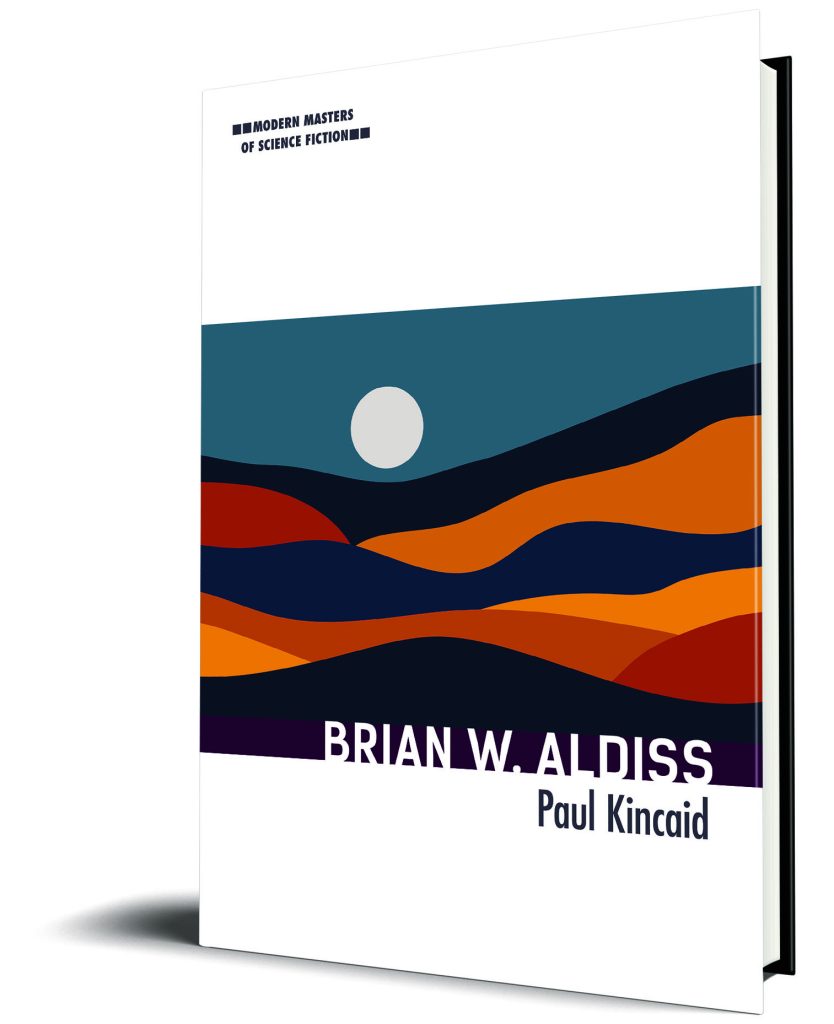Paul Kincaid, author of Brian W. Aldiss, answers questions on his book influences, editorial discoveries, and reader takeaways from his book.
Q: Why did you decide to write this book?
Brian Aldiss is generally recognized to have been one of the most important figures in the history of British science fiction, and yet there is remarkably little critical work about him. The last book length study was published some 35 years ago, and that was barely halfway through Aldiss’s career. There was an obvious gap here. I can understand why that might be, I have learned from experience that Aldiss is not an easy person to write about. But it had to be done, and in the end I’m glad I did it.
Q: Who were your biggest influences?
I suspect others may be far better placed to discern influences in my work than I am myself, mostly because I can think of far too many people whose work I admire and whose achievements I aspire to match. When I look at my own work, therefore, I can see the shadow of way more people than I could possibly name, and I am too close to be able to recognize the most prominent of those influences. But to throw a few names into the ring … Anyone who aspires to write science fiction criticism has to worship at the feet of John Clute, he is simply the best of us all. Aldiss himself was an influence: his Billion Year Spree was the first book about science fiction that I read with real pleasure, and that helped me decide this was something I might like to do. There are any number of essays by Samuel R. Delany that taught me how to look closely at what I was reading. How much any of those three can be discerned in my own writing I just don’t know, but I know they are there.
Q: What is the most interesting discovery you made while researching and writing your book?
Like most people who knew Aldiss, I knew him as a raconteur, as the source of an endless stream of often scurrilous stories. But as I was doing my research I realized that some of the stories he told over and over about his life didn’t always add up. Either his memory was faulty or he was embellishing details. Whatever the reasons, my first discovery was that I had to take everything he wrote about himself with a very large pinch of salt.
Sometimes the discoveries you make are accidental. One relatively minor example concerns the story about how he was instrumental in securing an Arts Council grant for the magazine New Worlds at a crucial moment in its history. It is a story that is repeated without question in every account of the New Wave I’ve seen. But while I was writing my book, I happened to be reading another book that I thought had nothing whatever to do with Aldiss. In that book I came across information about the early days of the Arts Council that made me realize that the story of the New Worlds grant wasn’t quite the way it is always presented.
Q: What myths do you hope your book will dispel or what do you hope your book will help readers unlearn?
This is tricky. There are many myths about Aldiss, most of them self-generated. I’ll give two examples.
He repeatedly said that he wrote Report on Probability A as way of saying thank you to the fans who voted to give him a Hugo Award for Hothouse. This is an unlikely claim anyway, but I realized that the original version of Report on Probability A had already been rejected by his published before Hothouse won the Hugo.
There is also a claim, not only from Aldiss himself but repeated in earlier books about him, that he had abandoned science fiction after the poor reception of Barefoot in the Head, and it was only by writing Billion Year Spree that he rediscovered the genre. Except that throughout the period between these two books he was writing a whole string of science fiction short stories, and co-editing (with Harry Harrison) a host of science fiction anthologies. Neither of which would be likely if he had indeed abandoned the genre.
Q: What is the most important idea you hope readers will take away from your book?
Brian Aldiss was a restless, experimental and, particularly in his early years, iconoclastic writer. In the way of things, experiments don’t always succeed, but the ones that did succeed were breathtakingly original. I hope that readers of my book will discover just how good his best work was, and why that made him undoubtedly one of the most important writers in post-war British science fiction.
Q: What do you like to read/watch/or listen to for fun?
The pandemic has really screwed with my reading. These days I am far more likely to be reading books on history, on art history, and on espionage than I ever did before the lockdown. I also tend to binge-watch tv more than I used to, anything from “The Queen’s Gambit” to “The Umbrella Academy”. As for music, I play guitar (badly, and very specifically for an audience of one, myself), so what I most listen to are things I’m trying to learn, mostly songs of a particular vintage like “AloneAgainOr”, “Werewolves of London”, “Blackbird”, “Can’t Find My Way Home” and so on.
Paul Kincaid is a Clareson Award-winning critic. His previous volume for Modern Masters of Science Fiction, Iain M. Banks, won a BSFA Award. His other books include What It Is We Do When We Read Science Fiction and The Unstable Realities of Christopher Priest.

